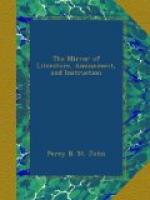* * * * *
We find that though sincerely a despiser of superstition, and with a frankness which must sometimes have been hazardous in his age, Caesar was himself superstitious. No man could have been otherwise who lived and conversed with that generation and people. But if superstitious, he was so after a mode of his own. In his very infirmities Caesar manifested his greatness; his very littlenesses were noble.
“Nec licuit populis parvum te, Nile, videre.”
That he placed some confidence in dreams, for instance, is certain; because, had he slighted them unreservedly, he would not have dwelt upon them afterwards, or have troubled himself to recall their circumstances. Here we trace his human weakness. Yet again we are reminded that it was the weakness of Caesar; for the dreams were noble in their imagery, and Caesarean (so to speak) in their tone of moral feeling. Thus, for example, the night before he was assassinated, he dreamt at intervals that he was soaring above the clouds on wings, and that he placed his hand within the right hand of Jove. It would seem that perhaps some obscure and half-formed image floated in his mind of the eagle, as the king of birds; secondly, as the tutelary emblem under which his conquering legions had so often obeyed his voice; and, thirdly, as the bird of Jove. To this triple relation of the bird his dream covertly appears to point. And a singular coincidence appears between this dream and a little anecdote brought down to us, as having actually occurred in Rome about twenty-four hours before his death. A little bird, which by some is represented as a very small kind of sparrow, but which, both to the Greeks and the Romans, was known by a name implying a regal station (probably from the ambitious courage which at times prompted it to attack the eagle), was observed to direct its flight towards the senate-house, consecrated by Pompey, whilst a crowd of other birds were seen to hang upon its flight in close pursuit. What might be the object of the chase, whether the little king himself, or a sprig of laurel which he bore in his mouth, could not be determined. The whole train, pursuers and pursued, continued their flight towards Pompey’s hall. Flight and pursuit were there alike arrested; the little king was overtaken by his enemies, who fell upon him as so many conspirators, and tore him limb from limb.
If this anecdote were reported to Caesar, which is not at all improbable, considering the earnestness with which his friends laboured to dissuade him from his purpose of meeting the senate on the approaching Ides of March, it is very little to be doubted that it had a considerable effect upon his feelings, and that, in fact, his own dream grew out of the impression which it had made. This way of linking the two anecdotes, as cause and effect, would also bring a third anecdote under the same nexus. We are told that Calpurnia, the last wife of Caesar,




